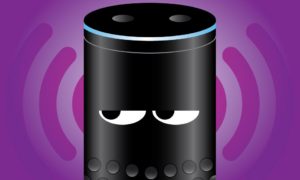This morning’s Observer column:
The problem with the future is that it’s unknowable. But of course that doesn’t stop us trying to second-guess it. At the moment, many people – and not just in the tech industry – are wondering about the impact of automation on employment. And not just blue-collar employment – the kind of jobs that were eliminated in the early phase of automating car production, for instance – but also the white-collar jobs that hitherto seemed secure…
At the end of the piece I mentioned (and applauded) Bill Gates’s suggestion that robots should be taxed — just as human workers are — to enable the social and human costs of automation to be mitigated. There’s a thoughtful Schumpeter column in this week’s Economist arguing that this might not be such a good idea.
“A robot is a capital investment”, writes the Schumpeter columnist,
like a blast furnace or a computer. Economists typically advise against taxing such things, which allow an economy to produce more. Taxation that deters investment is thought to make people poorer without raising much money. But Mr Gates seems to suggest that investment in robots is a little like investing in a coal-fired generator: it boosts economic output but also imposes a social cost, what economists call a negative externality. Perhaps rapid automation threatens to dislodge workers from old jobs faster than new sectors can absorb them. That could lead to socially costly long-term unemployment, and potentially to support for destructive government policy. A tax on robots that reduced those costs might well be worth implementing, just as a tax on harmful blast-furnace emissions can discourage pollution and leave society better off.
The biggest problem with the Gates proposal, he goes on, is not that automation is happening but that it is not happening quicker.
Mr Gates worries, understandably, about a looming era of automation in which machines take over driving or managing warehouses. Yet in an economy already awash with abundant, cheap labour, it may be that firms face too little pressure to invest in labour-saving technologies. Why refit a warehouse when people queue up to do the work at the minimum wage? Mr Gates’s proposal, by increasing the expense of robots relative to human labour, might further delay an already overdue productivity boom.
And even if automation speeds up, the share of income attributed to the machines might also decline quickly — or at any rate follow the historic trend.
A new working paper by Simcha Barkai, of the University of Chicago, concludes that, although the share of income flowing to workers has declined in recent decades, the share flowing to capital (ie, including robots) has shrunk faster. What has grown is the markup firms can charge over their production costs, >ie, their profits. Similarly, an NBER working paper published in January argues that the decline in the labour share is linked to the rise of “superstar firms”. A growing number of markets are “winner takes most”, in which the dominant firm earns hefty profits.
Large and growing profits are an indicator of market power. That power might stem from network effects (the value, in a networked world, of being on the same platform as everyone else), the superior productive cultures of leading firms, government protection, or something else. Waves of automation might necessitate sharing the wealth of superstar firms: through distributed share-ownership when they are public, or by taxing their profits when they are not. Robots are a convenient villain, but Mr Gates might reconsider his target; when firms enjoy unassailable market positions, workers and machines alike lose out.: the owners of robots have to be taxed so that the increases in productivity (and profits) that they enable is redistributed.
Thus by a roundabout route the Economist columnist reaches the right conclusion — although even then it’s a rather weaselly concession: waves of automation might necessitate sharing the wealth of superstar firms. Might??? Gates’s proposal may have been motivated by a shrewd conviction that, in this neoliberal world, redistributive taxation of that kind is never going to happen. Taxing robots like workers is, in contrast, something that even the dumbest government can organise.
LATER Yanis Varoufakis isn’t impressed by the Gates proposal.
